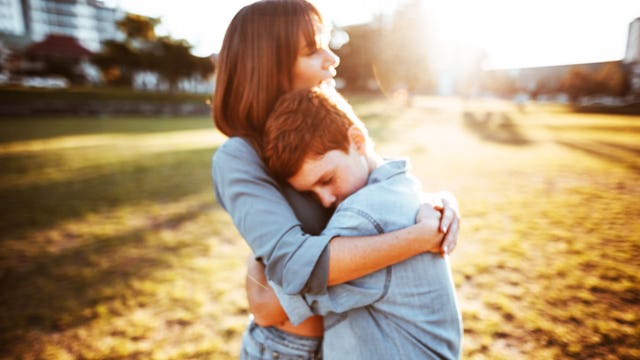My Divorce Changed My Relationship With My Sons

My son can tell I’ve been having a hard week. I’ve been trying to keep it to myself, but just like everyone else, I can’t play Pollyanna when I feel like Eeyore. I try to keep things light and airy and don’t talk about my private emotions with them when I’m struggling, but I also know the importance of being real for my children. I don’t want them growing up thinking everything has to be sunny and cheery all the damn time.
Since my divorce, one of the hardest things to figure out is when to put on a happy face and hold my sad feelings back, and when to let my kids know my true emotions when I’m struggling.
When their father lived here, I could vent to him. I could hold in most of my angst until the kids went to bed and then I’d have a safe person to confide in. Sure, I’ve always had girlfriends to talk to, but when your marriage is happy and your partnership strong, nothing brings you comfort like that other person does because you know you’re in this shit together.
As my marriage crumbled, I began to feel the void of having “my person” around for support in a big way. Girlfriends, family members, and my therapist can only offer so much support and compassion. They have their own lives; their own problems. Not to mention the general void that’s felt when you go from being a married person to a divorced person — it’s inevitable.
franckreporter/Getty
When your marriage ends, deep down you know you are doing life alone whether you have kids living with you or not. When they are with you, it’s all you. You want to be “on” and bring your A game because you don’t get a second chance when it comes to their childhood. Your job is to be there to guide and support them, and your time with them is more limited now.
Without an easy outlet for my feelings, my kids seem to be tuning in to my emotions more — especially if I’m sad or having an off day. Like yesterday when we were driving home from school, and my 15-year-old son kept trying to peek under my oversized sunglasses — the ones he knows only come out when I’m struggling to hide my sad eyes.
He started making jokes and tried to cheer me up. “Mom, when you get home you should relax and watch your show.” He asked me twice if I was okay.
I told him I was fine, but I couldn’t snap myself out of my sadness no matter how hard I tried. So then I finally confessed that I was sad. I reassured him that I was going to have sad days, that it’s normal to feel a bit down sometimes, and that I appreciated his concern, but it’s not his job to fix things.
When we got home, he took out the trash and mowed the lawn without being asked — a miracle of sorts. My son usually isn’t such a go-getter, and for a fleeting moment I wondered if the key to getting my kids to do shit might be to put on those oversized sunnies and sulk.
I’m kidding. For the most part anyway.
Since their father moved out over two years ago, there has been a shift in my kids, especially my sons. They’ve always been semi-conscious of my feelings — they weren’t completely oblivious — but they really started paying closer attention and checking in with me more after their dad and I separated. There is a kind of anxiety that surrounds my sons when I’m not having a good day, and it’s not easy to watch.
Divorce has many twist and turns, and I’ve tried not to take my kids along for the ride. They have their own feelings to deal with, after all, and as the adult, I need to be available to help them sort those out.
I’m thankful to be raising compassionate boys who notice when I’m feeling down, but I don’t want them to feel as if they need to replace part of their father’s role. Because that’s a heavy emotional burden for anyone, let alone a young kid. I want them to be concerned about their school work, who they are going to ask to the dance, and whether they can get a ride to the game — not whether their mom is feeling a little weepy.
They always ask me what my plans are before they leave to visit their dad. I started noticing if I told them I was just staying home, they’d text me a lot while they were away, and I could sense their concern. So I’ve started saying,”I’m not sure what I’m doing, probably going out” — even if my plans consist entirely of a date with my sofa and Netflix.
But they just don’t seem to believe me. Because kids know.
And this has been one of the hardest things about adjusting to post-divorce life. I don’t want my divorce forcing my sons to grow up too fast, or to feel like they need to give me emotional support in a way that crosses a boundary. I want them to have a fun, carefree childhood and to not have the burden of feeling like they need to take care of me.
So I’m working to find a balance. To teach them that we’re entitled to our feelings and to being authentic, but without putting an emotional burden on them to boost my mood. It’s a struggle to find that balance, and I’m still working on it. But I’ll keep at it. Because I want them to know that it’s okay to notice others’ feelings, but it’s not their duty to fix the situation — or me.
This article was originally published on